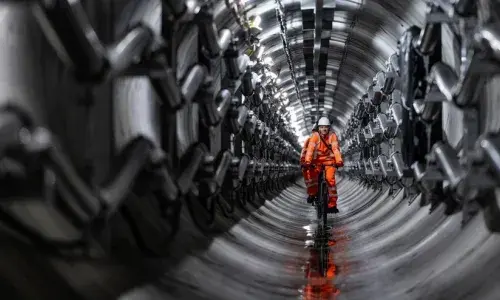
National Grid secures £15.3 million for three net zero innovation projects as part of Ofgem fund
- Ofgem scheme funds National Grid’s electricity transmission and distribution networks to develop three innovation projects.
- Projects include developing a long-term strategy to reduce dependency on SF6, using digital tools to support regional energy planning and maximising the capacity of the distribution network for low carbon technologies.
- The funding sees the projects progressing to the next stage of the regulator’s scheme to encourage innovation and help transform the UK’s energy systems in line with net zero.
Three National Grid-led projects developing electricity transmission and distribution network innovations will continue their work after securing £15.3 million from the next stage of Ofgem’s Strategic Innovation Fund (SIF) programme.
National Grid Electricity Transmission (NGET) has been awarded £8,500,724 for a project that will help develop a net zero electricity network by creating a long-term strategy to remove electrical insulating gas SF6 from the network.
National Grid Electricity Distribution (NGED) has been awarded £6,856,750 for two projects supporting local decision-making on regional energy planning for net zero on a single digital platform and addressing the potential load imbalance across phases in the distribution network as more customers opt for low carbon technologies.
The projects have been funded through the programme’s Beta Phase, which allows for the testing of innovation at a scale that can support future commercialisation and integration into the UK energy networks, typically following earlier feasibility work delivered through the Discovery and Alpha phases.
These funding awards will support National Grid’s efforts to accelerate the transition to a net zero future, while delivering tangible benefits to energy networks, local authorities and consumers.
See below for full project descriptions
Both NGET and NGED will be collaborating with the electricity system operator (ESO) on a separate SIF-funded Powering Wales Renewably project to accelerate low carbon energy in Wales. NGED is also working with Wales and West Utilities (WWU) on the NextGen Electrolysis project, aiming to reduce the cost of producing hydrogen, by using wastewater rather than high-purity water for the electrolysis process.
These projects are funded through the Strategic Innovation Fund, an Ofgem programme managed in partnership with Innovate UK.
Sean Coleman, Strategic Innovation Fund Manager at National Grid Electricity Transmission, said: “Innovation of new technologies and solutions is critical to meeting our decarbonisation goals and delivering the UK’s ambition for a net zero energy system.
“This funding represents a major opportunity for us to reduce and eventually eliminate our dependency on the greenhouse gas SF6, to deepen our understanding of SF6-free technologies and maintain the world-class reliability of our network.
"This is a key example of how National Grid and its partners in industry and academia are working together to solve some of the sector’s biggest challenges and drive forward the energy transition at pace.”
Paul Morris, Head of Future Capacity at National Grid Electricity Distribution, said: “National Grid Electricity Distribution is committed to driving innovation and collaboration to accelerate the transition to a sustainable energy future. The funding awards from the Ofgem Strategic Innovation Fund recognise the huge potential in both of these projects, and will enable us to further develop and deploy these cutting-edge solutions that contribute to achieving net zero and improving customer experience.”
Find out more in Ofgem’s full SIF funding announcement
Full list of projects and SIF funding:
National Grid Electricity Transmission
SF6 whole life strategy – £8,500,724
Developing an economic, efficient, holistic replacement and management strategy for the greenhouse gas sulphur hexafluoride (SF6) that will help to deliver Great Britain’s ambition for a clean, affordable energy system. PROJECT PARTNERS: The University of Manchester, SSEN Transmission, SP Energy Networks, DNV, DILO, WIKA.
National Grid Electricity Distribution
Planning Regional Infrastructure in a Digital Environment (PRIDE) – £3,733,400
In partnership with the West Midlands Combined Authority, Advanced Infrastructure Technology Ltd, Regen, and National Grid ESO, the PRIDE project focuses on using digital tools to share data and work more closely with local authorities on an integrated approach to planning and connecting low carbon technologies. Network data (on factors such as capacity) will give local authorities greater insight when drawing up their Local Area Energy Plans and enable them to plan projects and investment in energy, transport, heating and housing. In return, National Grid Electricity Distribution will obtain data from local authorities to help plan and deliver network development and reinforcement where it’s needed most to ensure the network is ready ahead of need. The project will start in November 2024.
Phase Switch System Project – £3,123,350
The Phase Switch System (PSS) addresses the potential load imbalance across phases in the distribution network as more customers opt for low carbon technologies such as heat pumps and electric vehicles. By automatically minimising phase imbalance, the PSS system maximises the capacity of the network allowing for more low carbon technology to be added to the network before network reinforcement is required. This means that National Grid Electricity Distribution can utilise its resource for LV reinforcement more efficiently at a time when workload is expected to increase. The additional benefits of the Phase Switch System include fewer outages caused by phase imbalance, resulting in reduced service visits and an improved customer experience. The reduction of losses is expected to have a positive impact on associated costs and carbon emissions.
Partner-led projects
Powering Wales Renewably – led by the ESO
Network companies and local government collaborating to accelerate low-carbon energy in Wales, taking a whole electricity system approach.
NextGen Electrolysis: Wastewater to Green Hydrogen – led by Wales and West Utilities
Aiming to reduce the cost of producing hydrogen, by using wastewater rather than high-purity water for the electrolysis process.


